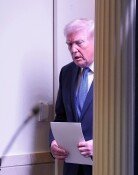Souths Pyongyang Policy Criticized
Souths Pyongyang Policy Criticized
Posted July. 08, 2006 03:00,
In the aftermath of North Koreas missile tests, the South Korean government has come under fire for its inconsistency in inter-Korean dialogue.
Seoul made a decision to delay general-level military talks, but to go ahead with high- level ministerial talks to be held next week.
Defense Minister Yoon Gwang-ung said in a news conference yesterday that North Korea had suggested a liaison officers meeting for a new round of general-level military talks two days before the missile test-firing; however, Cheong Wa Dae and the Ministry of Unification decided to reject the proposal after consultations and sent a telegram to the North on Thursday afternoon.
In the meantime, the Ministry of Unification said that it would open the 19th round of inter-Korean ministerial talks as scheduled for July 11 through 14 in Busan, and that it has already exchanged the list of delegations with the North.
Regarding this, criticism is mounting even within the ruling party. Some point out that postponing military dialogue to deal with the missile tests while holding ministerial talks for humanitarian aid to North Korea is out of the question.
Since Seoul has already stated that it would stop its fertilizer and food aid, ministerial talks would be a meaningless attempt to protest the missile provocation and notify the North about its decision. North Korea requested 500,000 tons of rice at the 18th round of ministerial talks in April its capital Pyongyang.
Amidst escalating tensions since the missile tests, discussing South Koreas investment in North Korea would be inappropriate, which many analysts warn will negatively affect Seouls partnership with its allies, the U.S. and Japan. The South Korean government is supposed to discuss with the North joint development of the mouth of the Han River and the special economic zone in Danchon, South Hamgyong province, a northern part of the Korean peninsula.
A government official expressed his concerns saying that South Korea would be a world mockery if North Korea abruptly calls off the ministerial talks just as it unilaterally canceled the planned trial operation of Gyeongui and Donghae railroads in May.
A ruling party member said that the ministerial level talks will cause internal conflicts in South Korea because many people object the inter-Korean contact. This party member went on to say that the government put more weight on dialogue with and aid to North Korea than on national security and defense as witnessed in its choice to continue holding ministerial talks while foregoing military talks.
Regarding such concerns, the foreign and defense ministries made a proposal to reconsider the talks at the security-related ministers meeting and the defense policy coordination meeting on July 5 and 6, only to meet resistance from the Unification Ministry.
Unification Minister Lee Jong-seok was alleged to have confirmed the opening of the ministerial-level talks with President Roh yesterday afternoon. Some in the government are raising their eyebrows over Lees action.
Meanwhile, Defense Minister Yoon said at the press conference that intelligence gathered information that a Taepodong-2 missile, different from the one North Korea launched on July 5, was transported to the Hwadae-gun missile base in North Hamgyong province. However, he also said that there no signs of Pyongyang assembling the Taepodong-2 missile were detected.
Yoo-Seong Hwang Myoung-Gun Lee yshwang@donga.com gun43@donga.com







